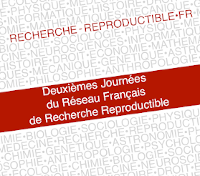Programme détaillé > Mardi 26 MarsMardi 26 Mars après-midi : "Introduction générale, contexte français et européen" 13h30 : Accueil
Résumé : Les pratiques de science ouverte favorisent la transparence et l'intégrité scientifique en encourageant l'accessibilité des données et des codes sources, largement reconnus par la communauté scientifique comme essentiels pour valider les résultats de recherche. Toutefois, il est essentiel de reconnaître que la science ouverte ne garantit pas automatiquement la reproductibilité des résultats. Celle-ci dépend de plusieurs facteurs, tels que la description des méthodes utilisées et la capacité à reproduire fidèlement les expériences. Bien que la science ouverte améliore la vérification et la validation des résultats, elle ne constitue pas une solution universelle pour assurer leur reproductibilité.
Ulf Toechl: Ulf obtained his PhD in biology at LMU Munich. His research includes cognitive neuroscience, quantitative methods and statistical modelling of decision making. After obtaining his teaching qualification in psychology, he joined the BIH QUEST Center for responsible Research. There he currently serves as a research group leader where his research team explores robust methodological approaches in preclinical settings to inform and improve research decisions. He is also currently the co-chair of the steering committee of the German reproducibility network. Abstract: Stimulated through the credibility reform, reproducible research and associated practices have gained increased attention. In this talk, I will highlight several initiatives on local and national level that contribute to a movement that aims to sustainably increase quality of scientific results. 16h00 - 16h30 Pause - café
Eva Furrer: Eva Furrer is Managing Director of the Center for Reproducible Science and a biostatistician at the Epidemiology, Biostatistics and Prevention Institute of the University of Zurich. Her research and teaching are focused on reproducible and sound methodology, good research practice and quality in the biomedical literature. Abstract : The Center for Reproducible Science (CRS) is a center of competence at the University of Zurich (UZH) since 2018. It promotes the principles of Rigor, Transparency and Reproducibility across all scientific disciplines. To date six of the seven faculties of UZH engage in the CRS. Its training offers in diverse aspects of Good Reseearch Practice are targeted towards PhD students and Postodcs and, to a lesser extent, master students. This talk will provide an overview of the history of CRS, its structure and its training offers. Moreover, its research projects related to Open Research Data and Reproducibility will be briefly portrayed.
|


